#coursera machine learning certifications
Explore tagged Tumblr posts
Text
Top Data Science Courses With Certificate ⬇️
1-IBM Data Science Professional Certificate
https://imp.i384100.net/YgYndj
2-Google Data Analytics Professional Certificate
https://imp.i384100.net/x9jAxk
3-Google Data Analytics Professional Certificate
https://imp.i384100.net/x9jAxk
4-Introduction to Data Science Specialization
https://imp.i384100.net/Ryqyry
5-Applied Data Science with Python Specialization
https://imp.i384100.net/GjkEPn
6-Google Advanced Data Analytics Professional Certificate
https://imp.i384100.net/1r5E3B
7-What is Data Science?
https://imp.i384100.net/JzmRaN
8-Data Science Specialization
https://imp.i384100.net/BX9BmB
9-Python for Data Science, AI & Development
https://imp.i384100.net/g1ARWv
10-Foundations of Data Science
https://imp.i384100.net/nL2Wza
11-IBM Data Analyst Professional Certificate
https://imp.i384100.net/jWGKxa
12-Machine Learning Specialization
https://imp.i384100.net/k0gLAV

#courses#coursera#google#data analytics#jobs#dataanalytics#dataanalysis#data science#data analyst jobs#data analysis#datascientist#machine learning#free courses#courses with certification#online courses
16 notes
·
View notes
Text
How to Choose the Right Machine Learning Course for Your Career

As the demand for machine learning professionals continues to surge, choosing the right machine learning course has become crucial for anyone looking to build a successful career in this field. With countless options available, from free online courses to intensive boot camps and advanced degrees, making the right choice can be overwhelming.
#machine learning course#data scientist#AI engineer#machine learning researcher#eginner machine learning course#advanced machine learning course#Python programming#data analysis#machine learning curriculum#supervised learning#unsupervised learning#deep learning#natural language processing#reinforcement learning#online machine learning course#in-person machine learning course#flexible learning#machine learning certification#Coursera machine learning#edX machine learning#Udacity machine learning#machine learning instructor#course reviews#student testimonials#career support#job placement#networking opportunities#alumni network#machine learning bootcamp#degree program
0 notes
Text
Is it possible to transition to a data scientist from a non-tech background at the age of 28?
Hi,
You can certainly shift to become a data scientist from a nontechnical background at 28. As a matter of fact, very many do. Most data scientists have actually shifted to this field from different academic and professional backgrounds, with some of them having changed careers even in their midlife years.

Build a Strong Foundation:
Devour some of the core knowledge about statistics, programming, and data analysis. Online classes, bootcamps—those are good and many, many convenient resources. Give it a whirl with Coursera and Lejhro for specific courses related to data science, machine learning and programming languages like Python and R.
A data scientist needs to be proficient in at least one or two programming languages. Python is the most used language for data science, for it is simple, and it has many libraries. R is another language that might come in handy for a data scientist, mostly in cases connected with statistical analysis. The study of manipulation libraries for study data and visualization tools includes Pandas for Python and Matplotlib and Seaborn for data, respectively.
Develop Analytical Skills:
The field of data science includes much analytics and statistics. Probability, hypothesis testing, regression analysis would be essential. These skills will help you derive meaningful information out of the data and also allow you to use statistical methods for real-world problems.
Practical experience is very important in the field of data science. In order to gain experience, one might work on personal projects or contribute to open-source projects in the same field. For instance, data analysis on publicly available datasets, machine learning, and creating models to solve particular problems, all these steps help to make the field more aware of skills with one's profile.
Though formal education in data science is by no means a requirement, earning a degree or certification in the discipline you are considering gives you great credibility. Many reputed universities and institutions offer courses on data science, machine learning, and analytics.
Connect with professionals in the same field: try to be part of communities around data science and attend events as well. You would be able to find these opportunities through networking and mentoring on platforms like LinkedIn, Kaggle, and local meetups. This will keep you abreast of the latest developments in this exciting area of research and help you land job opportunities while getting support.
Look out for entry-level job opportunities or internships in the field of data science; this, in effect, would be a great way to exercise your acquired experience so far. Such positions will easily expose one to a real-world problem related to data and allow seizing the occasion to develop practical skills. These might be entry-level positions, such as data analysts or junior data scientists, to begin with.
Stay Current with Industry Trends: Data science keeps on evolving with new techniques, tools, and technologies. Keep up to date with the latest trends and developments in the industry by reading blogs and research papers online and through courses.
Conclusion:
It is definitely possible to move into a data scientist role if one belongs to a non-tech profile and is eyeing this target at the age of 28. Proper approach in building the base of strong, relevant skills, gaining practical experience, and networking with industry professionals helps a lot in being successful in the transition. This is because data science as a field is more about skills and the ability to solve problems, which opens its doors to people from different backgrounds.
#bootcamp#data science course#datascience#python#big data#machinelearning#data analytics#ai#data privacy
3 notes
·
View notes
Text
Elevate Your Career With AWS: A In-depth Guide to Becoming an AWS Expert
In the fast-paced and ever-evolving realm of modern technology, proficiency in Amazon Web Services (AWS) has emerged as an invaluable asset, a passport to the boundless opportunities of the digital age. AWS, the colossal titan of cloud computing, offers an extensive array of services that have revolutionized the way businesses operate, innovate, and scale in today's interconnected world. However, mastering AWS is not a mere task; it is a journey that calls for a structured approach, hands-on experience, and access to a treasure trove of reputable learning resources.

Welcome to the world of AWS mastery, where innovation knows no bounds, where your skills become the catalyst for transformative change. Your journey begins now, as we set sail into the horizon of AWS excellence, ready to explore the limitless possibilities that await in the cloud.
Step 1: Setting Sail - Sign Up for AWS
Your AWS voyage begins with a simple yet crucial step - signing up for an AWS account. Fortunately, AWS offers the Free Tier, a generous offering that grants limited free access to many AWS services for the first 12 months. This enables you to explore AWS, experiment with its services, and learn without incurring costs.
Step 2: Unveiling the Map - Official AWS Documentation
Before you embark on your AWS adventure, it's essential to understand the lay of the land. AWS provides extensive documentation for all its services. This documentation is a treasure of knowledge, offering insights into each service, its use cases, and comprehensive guides on how to configure and utilize them. It's a valuable resource that is regularly updated to keep you informed about the latest developments.
Step 3: Guided Tours - Online Courses and Tutorials
While solo exploration is commendable, guided tours can significantly enhance your learning experience. Enroll in online courses and tutorials offered by reputable platforms such as Coursera, Udemy, ACTE, or AWS Training and Certification. These courses often include video lectures, hands-on labs, and quizzes to reinforce your understanding. Consider specialized AWS training programs like those offered by ACTE Technologies, where expert-led courses can take your AWS skills to the next level.
Step 4: Raising the Flag - AWS Certification
Achieving AWS certification is akin to hoisting your flag of expertise in the AWS realm. AWS offers a range of certifications that validate your proficiency in specific AWS areas, including Solutions Architect, Developer, SysOps Administrator, and more. Preparing for these certifications provides in-depth knowledge, and there are study guides and practice exams available to aid your preparation.
Step 5: Hands-on Deck - Practical Experience
In the world of AWS, knowledge is best acquired through hands-on experience. Create AWS accounts designated for practice purposes, set up virtual machines (EC2 instances), configure storage (S3), and experiment with various AWS services. Building real projects is an effective way to solidify your understanding and showcase your skills.
Step 6: Navigating the AWS Console and CLI
As you progress, it's essential to be fluent in navigating AWS. Familiarize yourself with the AWS Management Console, a web-based interface for managing AWS resources. Additionally, learn to wield the AWS Command Line Interface (CLI), a powerful tool for scripting and automating tasks, giving you the agility to manage AWS resources efficiently.
Step 7: Joining the Crew - Community Engagement
Learning is often more enriching when you're part of a community. Join AWS-related forums and communities, such as the AWS subreddit and AWS Developer Forums. Engaging with others who are on their own AWS learning journeys can help you get answers to your questions, share experiences, and gain valuable insights.
Step 8: Gathering Wisdom - Blogs and YouTube Channels
Stay updated with the latest trends and insights in the AWS ecosystem by following AWS blogs and YouTube channels. These platforms provide tutorials, case studies, and deep dives into AWS services. Don't miss out on AWS re:Invent sessions, available on YouTube, which offer in-depth explorations of AWS services and solutions.
Step 9: Real-World Adventures - Projects
Application of your AWS knowledge to practical projects is where your skills truly shine. Whether it's setting up a website, creating a scalable application, or orchestrating a complex migration to AWS, hands-on experience is invaluable. Real-world projects not only demonstrate your capabilities but also prepare you for the challenges you might encounter in a professional setting.
Step 10: Staying on Course - Continuous Learning
The AWS landscape is ever-evolving, with new services and features being introduced regularly. Stay informed by following AWS news, subscribing to newsletters, and attending AWS events and webinars. Continuous learning is the compass that keeps you on course in the dynamic world of AWS.
Step 11: Guiding Lights - Mentorship
If possible, seek out a mentor with AWS experience. Mentorship provides valuable guidance and insights as you learn. Learning from someone who has navigated the AWS waters can accelerate your progress and help you avoid common pitfalls.

Mastering AWS is not a destination; it's a continuous journey. As you gain proficiency, you can delve into advanced topics and specialize in areas that align with your career goals. The key to mastering AWS lies in a combination of self-study, hands-on practice, and access to reliable learning resources.
In conclusion, ACTE Technologies emerges as a trusted provider of IT training and certification programs, including specialized AWS training. Their expert-led courses and comprehensive curriculum make them an excellent choice for those looking to enhance their AWS skills. Whether you aim to propel your career or embark on a thrilling journey into the world of cloud computing, ACTE Technologies can be your steadfast partner on the path to AWS expertise.
AWS isn't just a skill; it's a transformative force in the world of technology. It's the catalyst for innovation, scalability, and boundless possibilities. So, set sail on your AWS journey, armed with knowledge, practice, and the determination to conquer the cloud. The world of AWS awaits your exploration.
9 notes
·
View notes
Text
Exploring Game-Changing Applications: Your Easy Steps to Learn Machine Learning:
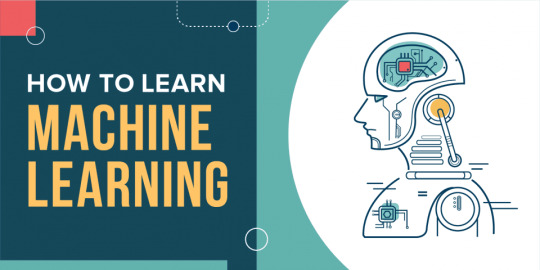
Machine learning technology has truly transformed multiple industries and continues to hold enormous potential for future development. If you're considering incorporating machine learning into your business or are simply eager to learn more about this transformative field, seeking advice from experts or enrolling in specialized courses is a wise step. For instance, the ACTE Institute offers comprehensive machine learning training programs that equip you with the knowledge and skills necessary for success in this rapidly evolving industry. Recognizing the potential of machine learning can unlock numerous avenues for data analysis, automation, and informed decision-making.
Now, let me share my successful journey in machine learning, which I believe can benefit everyone. These 10 steps have proven to be incredibly effective in helping me become a proficient machine learning practitioner:
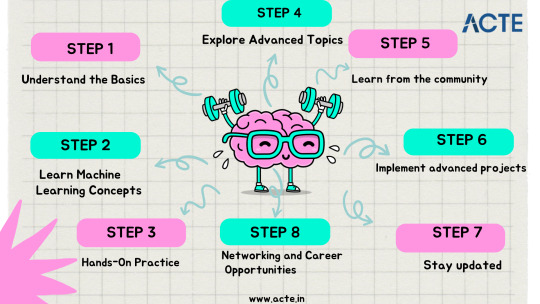
Step 1: Understand the Basics
Develop a strong grasp of fundamental mathematics, particularly linear algebra, calculus, and statistics.
Learn a programming language like Python, which is widely used in machine learning and provides a variety of useful libraries.
Step 2: Learn Machine Learning Concepts
Enroll in online courses from reputable platforms like Coursera, edX, and Udemy. Notably, the ACTE machine learning course is a stellar choice, offering comprehensive education, job placement, and certification.
Supplement your learning with authoritative books such as "Hands-On Machine Learning with Scikit-Learn, Keras, and TensorFlow" by Aurélien Géron and "Pattern Recognition and Machine Learning" by Christopher Bishop.
Step 3: Hands-On Practice:
Dive into real-world projects using both simple and complex datasets. Practical experience is invaluable for gaining proficiency.
Participate in machine learning competitions on platforms like Kaggle to challenge yourself and learn from peers.
Step 4: Explore Advanced Topics
Delve into deep learning, a critical subset of machine learning that focuses on neural networks. Online resources like the Deep Learning Specialisation on Coursera are incredibly informative.
For those intrigued by language-related applications, explore Natural Language Processing (NLP) using resources like the "Natural Language Processing with Python" book by Steven Bird and Ewan Klein.
Step 5: Learn from the Community
Engage with online communities such as Reddit's r/Machine Learning and Stack Overflow. Participate in discussions, seek answers to queries, and absorb insights from others' experiences.
Follow machine learning blogs and podcasts to stay updated on the latest advancements, case studies, and best practices.
Step 6: Implement Advanced Projects
Challenge yourself with intricate projects that stretch your skills. This might involve tasks like image recognition, building recommendation systems, or even crafting your own AI-powered application.
Step 7: Stay updated
Stay current by reading research papers from renowned conferences like NeurIPS, ICML, and CVPR to stay on top of cutting-edge techniques.
Consider advanced online courses that delve into specialized topics such as reinforcement learning and generative adversarial networks (GANs).
Step 8: Build a Portfolio
Showcase your completed projects on GitHub to demonstrate your expertise to potential employers or collaborators.
Step 9: Network and Explore Career Opportunities
Attend conferences, workshops, and meetups to network with industry professionals and stay connected with the latest trends.
Explore job opportunities in data science and machine learning, leveraging your portfolio and projects to stand out during interviews.
In essence, mastering machine learning involves a step-by-step process encompassing learning core concepts, engaging in hands-on practice, and actively participating in the vibrant machine learning community. Starting from foundational mathematics and programming, progressing through online courses and projects, and eventually venturing into advanced topics like deep learning, this journey equips you with essential skills. Embracing the machine learning community and building a robust portfolio opens doors to promising opportunities in this dynamic and impactful field.
9 notes
·
View notes
Text
AWS Mastery Unveiled: Your Step-by-Step Journey into Cloud Proficiency
In today's rapidly evolving tech landscape, mastering cloud computing is a strategic move for individuals and businesses alike. Amazon Web Services (AWS), as a leading cloud services provider, offers a myriad of tools and services to facilitate scalable and efficient computing. With AWS Training in Hyderabad, professionals can gain the skills and knowledge needed to harness the capabilities of AWS for diverse applications and industries. Whether you're a seasoned IT professional or a beginner eager to dive into the cloud, here's a step-by-step guide to learning and mastering Amazon AWS.
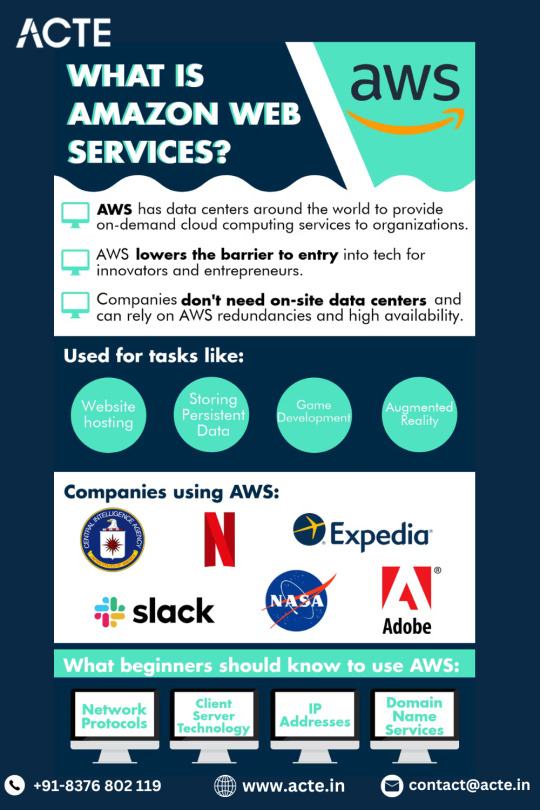
1. Start with AWS Documentation:
The foundation of your AWS journey begins with the official AWS documentation. This vast resource provides detailed information, tutorials, and guides for each AWS service. Take the time to familiarize yourself with the terminologies and fundamental concepts. Understanding the basics lays a solid groundwork for more advanced learning.
2. Enroll in AWS Training and Certification:
AWS provides a dedicated training and certification program to empower individuals with the skills required in today's cloud-centric environment. Explore the AWS Training and Certification portal, which offers a range of courses, both free and paid. Commence your AWS certification journey with the AWS Certified Cloud Practitioner, progressively advancing to specialized certifications aligned with your career goals.
3. Hands-On Practice with AWS Free Tier:
Theory is valuable, but hands-on experience is paramount. AWS Free Tier allows you to experiment with various services without incurring charges. Seize this opportunity to get practical, testing different services and scenarios. This interactive approach reinforces theoretical knowledge and builds your confidence in navigating the AWS console.
4. Explore Online Courses and Tutorials:
Several online platforms offer structured AWS courses. Websites like Coursera, Udemy, and A Cloud Guru provide video lectures, hands-on labs, and real-world projects. These courses cover a spectrum of topics, from foundational AWS concepts to specialized domains like AWS security and machine learning. To master the intricacies of AWS and unlock its full potential, individuals can benefit from enrolling in the Top AWS Training Institute. This training ensures that professionals gain the expertise needed to navigate the complexities of AWS, empowering them to contribute effectively to their organizations' digital transformation and success.
5. Build Projects and Apply Knowledge:
The true test of your AWS proficiency lies in applying your knowledge to real-world projects. Start small, perhaps by deploying a static website on Amazon S3. As you gain confidence, move on to more complex projects, such as configuring a virtual server on Amazon EC2 or creating a serverless application using AWS Lambda. Practical application solidifies your understanding and hones your problem-solving skills.
6. Join AWS Communities and Forums:
Learning is a collaborative effort. Joining AWS communities and forums allows you to connect with like-minded individuals, seek advice, and share your experiences. Platforms like the AWS Developer Forums provide a space for discussing challenges and learning from others' insights. Networking within the AWS community can open doors to valuable opportunities and collaborations.
7. Read AWS Whitepapers and Case Studies:
AWS regularly publishes whitepapers covering best practices, architecture recommendations, and real-world case studies. Delve into these resources to gain deeper insights into how AWS services are applied in diverse scenarios. Whitepapers provide a wealth of knowledge on topics such as security, scalability, and cost optimization.
8. Experiment with AWS CLI and SDKs:
Command Line Interface (CLI) proficiency is a valuable skill for any AWS practitioner. Familiarize yourself with the AWS CLI, as well as Software Development Kits (SDKs) for your preferred programming languages. Automating tasks through the CLI and integrating AWS services into your applications enhances efficiency and allows for more sophisticated configurations.
9. Attend AWS Events and Webinars:
Stay abreast of the latest AWS trends, updates, and best practices by attending AWS events, webinars, and conferences. These platforms often feature expert speakers, product announcements, and in-depth discussions on specific AWS topics. Engaging with industry leaders and experts provides valuable insights into the current state and future direction of AWS.
10. Stay Updated and Adapt:
The cloud computing landscape is dynamic, with AWS continually introducing new services and updates. Subscribe to AWS newsletters, follow AWS blogs, and listen to AWS-focused podcasts to stay informed about the latest developments. Continuous learning is key to adapting to the evolving cloud technology landscape.

In conclusion, mastering Amazon AWS is a journey that combines theoretical understanding, hands-on experience, and active participation in the AWS community. By following these ten steps, you can develop a comprehensive skill set that empowers you to leverage AWS effectively, whether you're building applications, optimizing processes, or advancing your career in the cloud.
2 notes
·
View notes
Text
Cracking the Code: A Beginner's Roadmap to Mastering Data Science
Embarking on the journey into data science as a complete novice is an exciting venture. While the world of data science may seem daunting at first, breaking down the learning process into manageable steps can make the endeavor both enjoyable and rewarding. Choosing the best Data Science Institute can further accelerate your journey into this thriving industry.
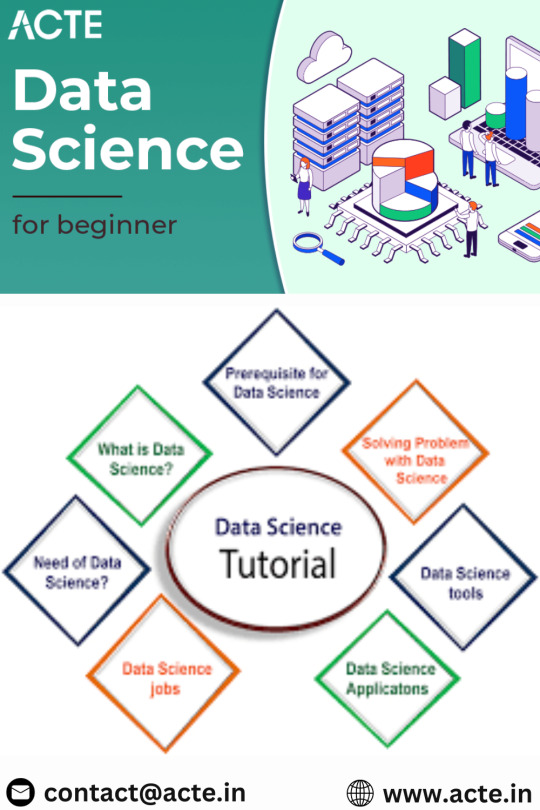
In this comprehensive guide, we'll outline a roadmap for beginners to get started with data science, from understanding the basics to building a portfolio of projects.
1. Understanding the Basics: Laying the Foundation
The journey begins with a solid understanding of the fundamentals of data science. Start by familiarizing yourself with key concepts such as data types, variables, and basic statistics. Platforms like Khan Academy, Coursera, and edX offer introductory courses in statistics and data science, providing a solid foundation for your learning journey.
2. Learn Programming Languages: The Language of Data Science
Programming is a crucial skill in data science, and Python is one of the most widely used languages in the field. Platforms like Codecademy, DataCamp, and freeCodeCamp offer interactive lessons and projects to help beginners get hands-on experience with Python. Additionally, learning R, another popular language in data science, can broaden your skill set.
3. Explore Data Visualization: Bringing Data to Life
Data visualization is a powerful tool for understanding and communicating data. Explore tools like Tableau for creating interactive visualizations or dive into Python libraries like Matplotlib and Seaborn. Understanding how to present data visually enhances your ability to derive insights and convey information effectively.
4. Master Data Manipulation: Unlocking Data's Potential
Data manipulation is a fundamental aspect of data science. Learn how to manipulate and analyze data using libraries like Pandas in Python. The official Pandas website provides tutorials and documentation to guide you through the basics of data manipulation, a skill that is essential for any data scientist.
5. Delve into Machine Learning Basics: The Heart of Data Science
Machine learning is a core component of data science. Start exploring the fundamentals of machine learning on platforms like Kaggle, which offers beginner-friendly datasets and competitions. Participating in Kaggle competitions allows you to apply your knowledge, learn from others, and gain practical experience in machine learning.
6. Take Online Courses: Structured Learning Paths
Enroll in online courses that provide structured learning paths in data science. Platforms like Coursera (e.g., "Data Science and Machine Learning Bootcamp with R" or "Applied Data Science with Python") and edX (e.g., "Harvard's Data Science Professional Certificate") offer comprehensive courses taught by experts in the field.
7. Read Books and Blogs: Supplementing Your Knowledge
Books and blogs can provide additional insights and practical tips. "Python for Data Analysis" by Wes McKinney is a highly recommended book, and blogs like Towards Data Science on Medium offer a wealth of articles covering various data science topics. These resources can deepen your understanding and offer different perspectives on the subject.
8. Join Online Communities: Learning Through Connection
Engage with the data science community by joining online platforms like Stack Overflow, Reddit (e.g., r/datascience), and LinkedIn. Participate in discussions, ask questions, and learn from the experiences of others. Being part of a community provides valuable support and insights.
9. Work on Real Projects: Applying Your Skills
Apply your skills by working on real-world projects. Identify a problem or area of interest, find a dataset, and start working on analysis and predictions. Whether it's predicting housing prices, analyzing social media sentiment, or exploring healthcare data, hands-on projects are crucial for developing practical skills.
10. Attend Webinars and Conferences: Staying Updated
Stay updated on the latest trends and advancements in data science by attending webinars and conferences. Platforms like Data Science Central and conferences like the Data Science Conference provide opportunities to learn from experts, discover new technologies, and connect with the wider data science community.
11. Build a Portfolio: Showcasing Your Journey
Create a portfolio showcasing your projects and skills. This can be a GitHub repository or a personal website where you document and present your work. A portfolio is a powerful tool for demonstrating your capabilities to potential employers and collaborators.
12. Practice Regularly: The Path to Mastery
Consistent practice is key to mastering data science. Dedicate regular time to coding, explore new datasets, and challenge yourself with increasingly complex projects. As you progress, you'll find that your skills evolve, and you become more confident in tackling advanced data science challenges.
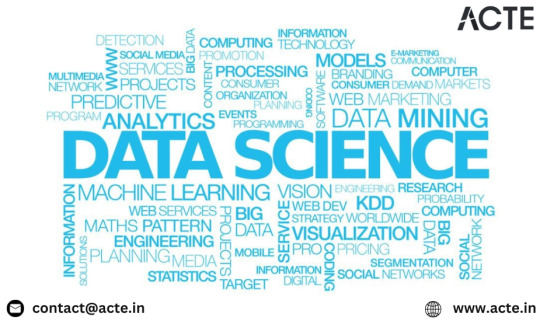
Embarking on the path of data science as a beginner may seem like a formidable task, but with the right resources and a structured approach, it becomes an exciting and achievable endeavor. From understanding the basics to building a portfolio of real-world projects, each step contributes to your growth as a data scientist. Embrace the learning process, stay curious, and celebrate the milestones along the way. The world of data science is vast and dynamic, and your journey is just beginning. Choosing the best Data Science courses in Chennai is a crucial step in acquiring the necessary expertise for a successful career in the evolving landscape of data science.
3 notes
·
View notes
Text
How to Begin Your Web Design Journey: A Step-by-Step Guide in Simple Terms

Understanding the Basics:
Learn about HTML, which is like a web page’s skeleton.
Understand CSS, which is like makeup for web pages.
Know how to make websites look good on different screens.
2. Choose your tools:
Start with simple text editors like Notepad (for Windows) or TextEdit (for Mac).
Later, try fancier editors like Visual Studio Code.
For making pictures, try Adobe Photoshop or Illustrator.
3. Learn HTML and CSS:
Use websites like W3Schools or Codecademy.
If you want to learn more about web design with certification and placement, ACTE Institute offers comprehensive machine learning training courses that can give you the knowledge and skills necessary to excel in this field. Consider the infinite possibilities for data analysis, automation, and decision-making that machine learning may create.
YouTube: There are many video tutorials covering HTML and CSS for beginners.
They teach you how to make web pages and make them look nice.
You can also learn from courses on Coursera or edX.
4. Practice your skills.
Besides learning, make simple web pages to get better.
Try harder projects as you get more confident.
Make your own website to practice lots.
5. Responsive Web Design:
Make sure your websites work well on phones and computers.
Learn about media queries (they help your design fit different screens).
6. Master CSS Layouts:
Get really good at arranging web stuff using CSS (like making boxes and arranging them nicely).
7. Web Design Frameworks:
Think about using ready-made kits like Bootstrap.
They have pre-made pieces to help you design faster.
8. UI/UX Design:
Learn to make websites easy to use and nice to look at.
Think about how people will use your site.
9. Web Hosting and Domain:
To show your website to people, you need a place to put it (hosting) and a name for it (domain).
Lots of companies can help with this, like Bluehost or HostGator.
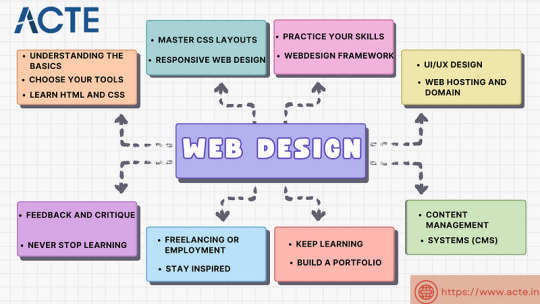
10. Content Management Systems (CMS):
Consider using tools like WordPress to manage your website easily.
11. Keep Learning:
Web design keeps changing, so keep learning new stuff.
Read blogs, watch webinars, and take more advanced classes.
12. Build a portfolio.
Make a collection of your best work to show others.
People who might hire you want to see what you can do.
13. Freelancing or employment:
Decide if you want to work alone or with a company.
Both ways have good things and not-so-good things, so pick what you like.
14. Networking:
Join groups of web designers to meet others like you.
Learning from others can help you become better.
15. Feedback and criticism:
Don’t be shy to ask for advice on your work.
When people give you tips, it helps you improve.
16. Launch your projects:
When you’re good enough, work on real websites.
Offer to make websites for friends or local businesses.
17. Stay Inspired:
Be creative and get ideas from different places.
Nature, art, and other designers can help you think of cool stuff.
18. Never Stop Learning:
Web design always changes, so keep learning new things.
Stay curious and open to learning more tricks and tools.
The secret to success in web design is to start with the fundamentals and gradually advance your abilities. Keep in mind that on this trip, patience and practice are the keys to success. As your skills advance, you’ll have the imagination needed to realise your ideas for websites. So put your hands in your pockets, launch your preferred coding editor, and start your web design experience!
4 notes
·
View notes
Text
Building Future-Ready Skills: Data Science Courses in Noida

Building future-ready skills in data science is essential in today's data-driven world. Noida, as a growing technology hub, offers a range of data science courses and programs to help individuals develop the skills needed to excel in this field. Here's a look at some data science courses and programs available in Noida:
Bachelor's Degree Programs:
Many universities and colleges in Noida offer undergraduate programs in computer science, data science, or related fields. These programs provide a solid foundation in programming, statistics, and data analysis.
Example: B.Sc. in Data Science, B.Tech in Computer Science with Data Science specialization.
Master's Degree Programs:
Postgraduate programs in data science, business analytics, and artificial intelligence are popular choices for those looking to specialize in this field.
Example: M.Sc. in Data Science, M.Tech in Artificial Intelligence, MBA in Business Analytics.
Postgraduate Diploma in Data Science:
Many institutes and universities offer one-year postgraduate diploma programs specifically designed to equip students with practical data science skills.
Example: Postgraduate Diploma in Data Science and Machine Learning.
Certification Courses:
Short-term certification courses provide focused training in data science tools, techniques, and programming languages.
Example: Certificate in Data Science, Python for Data Science Certification.
Online Courses:
Online learning platforms like Coursera, edX, and Udemy offer a wide range of data science courses that can be taken from anywhere in Noida.
Example: "Data Science Specialization" on Coursera, "Data Science MicroMasters" on edX.
Corporate Training Programs:
Some IT companies and consulting firms in Noida offer in-house data science training programs for their employees, which can be highly specialized and job-oriented.
Data Analytics Bootcamps:
Bootcamps are intensive, short-term programs that focus on practical skills and often include real-world projects.
Example: Data Science Bootcamp, Machine Learning Bootcamp.
Specialized Workshops and Seminars:
Noida hosts various workshops, seminars, and meetups related to data science, machine learning, and artificial intelligence. These events provide an opportunity to learn from experts and network with professionals in the field. let's delve deeper into the various aspects of data science courses in Noida:
1. Curriculum and Topics Covered:
Data science courses typically cover a wide range of topics, including data analysis, machine learning, statistical modeling, data visualization, and programming languages such as Python and R. Ensure that the course you choose aligns with your career goals and interests.
2. Practical Experience:
Practical experience is crucial in data science. Look for programs that offer hands-on projects, case studies, and access to real datasets. Practical exposure helps you apply your knowledge to real-world problems.
3. Faculty Expertise:
The quality of instructors can greatly impact your learning experience. Research the faculty's qualifications, industry experience, and their contributions to the field of data science.
4. Industry Connections and Internship Opportunities:
Institutes with strong ties to the industry often provide opportunities for internships and collaborations with companies. These experiences can help you gain practical experience and potentially lead to job offers.
5. Placement Assistance:
Check whether the institute offers placement support and has a track record of placing students in reputable companies. Good placement assistance can significantly boost your career prospects.
6. Flexibility and Duration:
Consider your schedule and preferences. Some courses are full-time, while others offer part-time or online options, making it easier for working professionals to upskill.
7. Certification and Accreditation:
Look for courses that provide industry-recognized certifications upon completion. These certifications can enhance your credibility in the job market.
8. Alumni Network:
Institutes with active alumni networks can be valuable for networking, mentorship, and job referrals. Connect with alumni to gain insights into their experiences and career paths.
Kickstart your career by enrolling in this data analyst course noida
9. Cost and Financial Aid:
Compare the costs of different programs and check if there are any scholarships, financial aid, or installment options available to ease the financial burden.
10. Continuing Education and Resources:
Data science is an ever-evolving field. Choose an institute that supports lifelong learning through resources, workshops, and alumni access to updated content.
11. Infrastructure and Technology:
Ensure that the institute has the necessary infrastructure, including computer labs with the latest software and tools for data analysis.
12. Course Reviews and Testimonials:
Read reviews and testimonials from previous students to gauge their satisfaction with the course and its impact on their careers.
13. Location and Networking:
Noida's proximity to Delhi and its thriving tech industry provides ample networking opportunities, as well as access to tech conferences, seminars, and job fairs.
Don’t delay your career growth, kickstart your career by enrolling in this business analytics course in noida
14. Specializations:
Depending on your interests and career goals, consider whether the program offers specializations in areas like deep learning, natural language processing, or big data analytics.
youtube
Remember that building a successful career in data science requires dedication, continuous learning, and practical application of skills. Therefore, choose a course that not only imparts knowledge but also equips you with the ability to adapt to the ever-changing landscape of data science. Additionally, consider seeking advice from professionals already working in the field to gain insights into the most relevant skills and courses for your specific career aspirations.
When choosing a data science course in Noida, consider your background, career goals, and preferred learning format. It's also important to research the institute or platform offering the course, review the curriculum, and seek feedback from past students if possible. Additionally, look for programs that provide hands-on experience and opportunities for practical application of data science skills, as real-world projects can significantly enhance your learning and future employability.
Source link: Data Analytics Case Studies
Top 12 IT Companies in Noida
2 notes
·
View notes
Text
How Google AI Bard is Revolutionizing the Creative Arts
Google AI Bard is a cutting-edge artificial intelligence technology that uses machine learning algorithms to analyze and create poetry and music. The technology uses complex algorithms to analyze large amounts of data and then generate original pieces of work based on that data. The results are often surprising, unique, and thought-provoking, with the potential to change the way we view and understand creativity.
For More Details Click Here:
#google ai#artificial intelligence#ai art#technology#chatgpt#education#information#do you know#collage#engineering#new technology
4 notes
·
View notes
Text
Machine Learning
0 notes
Text
How to Become an AI Expert

AI is transforming the world, from self-driving cars to smart assistants. The best part? You don’t need an Ivy League degree to get started.
Why AI is the Career of the Future
AI is used in healthcare, finance, e-commerce, and more, creating a surge in demand for AI professionals. High-paying jobs like AI engineers and data scientists are in abundance.
How to Become an AI Expert
1. Learn the Basics
Master Python and essential math concepts like linear algebra and probability using free resources like Khan Academy and Coursera.
2. Gain AI & Machine Learning Knowledge
Take courses like Andrew Ng’s Machine Learning Course or Google AI’s Free Crash Course.
3. Build Projects
Showcase your skills with projects like chatbots, image recognition, or AI-driven recommendation systems.
4. Get Certified
Boost your resume with AI certifications from IBM, Google, or Microsoft.
5. Network & Stay Updated
Join AI communities on LinkedIn and Reddit, and follow industry leaders like Andrew Ng.
The Future of AI Careers
With billions invested in AI, now is the best time to start. No expensive degree needed—just curiosity and commitment!
1 note
·
View note
Text
How AI is Revolutionizing Online Certifications – The Future of Learning
Introduction
Online learning has exploded in popularity, and AI is taking it to the next level. From personalized course recommendations to AI-driven assessments, technology is reshaping how we acquire certifications.
How AI is Changing Online Certifications
AI-Powered Adaptive Learning – Platforms like Coursera and Udacity use AI to tailor content based on a learner’s progress and weaknesses.
Automated Proctoring – AI ensures integrity in online exams by detecting cheating behaviors through facial recognition and eye-tracking.
AI-Based Skill Assessment – Instead of traditional exams, AI-powered simulations and coding challenges evaluate real-world skills dynamically.
Chatbots as Personal Mentors – AI-driven chatbots like ChatGPT now act as 24/7 study guides, answering queries and explaining concepts in real time.
AI Certifications to Consider
To stay ahead in the AI revolution, here are some top AI certifications that leverage AI-driven assessments and training:
Google Professional Machine Learning Engineer – Best for those looking to build AI models in production.
IBM AI Engineering Professional Certificate – Covers deep learning, ML, and AI applications.
Microsoft Azure AI Engineer Associate – Ideal for cloud-based AI solutions.
AWS Certified Machine Learning – Specialty – Great for professionals working with AI on AWS.
AICerts AI & ML Certification – AICerts is gaining recognition for its industry-focused AI certifications, offering a structured path for AI engineers and analysts.
Conclusion
AI is making certifications more interactive, personalized, and secure. Platforms like AICerts and other tech giants are driving this transformation, making AI education more accessible and skill-oriented.
0 notes
Text
Navigate the Top HR Analytics Certifications to Propel Your Career

In the present world of data, Human Resources is no longer about just getting a person hired and then paying for his airfare. The human resource has to work on data analytics to make intelligent business decisions that lead to growth. The HR analytics certification can help one in becoming a successful HR analytics professional.
Understanding HR Analytics: The Key to Data-Driven Human Resource Management
HR Analytics is collecting data related to the workforce and evaluating and interpreting that data for making decisions. HR analytics within organizations has been applied to measure such things as performance, turnover, recruitment efficiency, and the diversity of its workforce.
With AI and machine learning coming to the fore in an organization's strategic decision-making, HR analytics become integral to modern HR strategies. Organizations depend on HR professionals to make sense of complex data and offer actionable insights. With an HR analytics course to your credit, you'll be able to get a lot of corporate wisdom out of raw HR statistical data.
Top HR Analytics Certifications in 2025: Elevate Your Expertise
A certification in HR data analytics will not only bolster your CV but also give you the latest tools and techniques in HR analytics. Here are the top HR analytics certifications to consider in 2025.
1. MindCypress HR Analytics Certification
MindCypress is entirely an e-learning performance improvement CD-IT course for the community of HR professionals, recruiters, business leaders, and data scientists. All those who seek a qualification will study data visualization, predictive analytics, and workforce planning, which would nicely enable them to perform any reasonably disciplined and accurate analysis and interpretation of HR data.
2. Coursera-HR Analytics Specialization (University of Pennsylvania)
The online certification course inspired by the University of Pennsylvania focuses on a rich and comprehensive HR analytics curriculum covering performance measures, retention, and information-based decision-making.
3. HR Analytics Certificate Program – eCornell
This program teaches statistical analysis, workforce planning, and predictive modeling for HR analytics. This is a great option for HR professionals who look to position data analytics in their HR practice.
4. AIHR – People Analytics Certificate
Academy to Innovate HR (AIHR) constitutes a People Analytics Certificate which showcases how HR personnel can leverage AI and machine learning in HR analytics. This course is best for those who wish to be future-ready in trend technologies within the HR domain.
Why You Should Get Certified in HR Analytics
Stay Competitive in the Job Market – Organizations are also getting more and more interested in employing HR professionals with data analytics skills. A certificate will make a difference for you. It shall also allow you to get more accurate HR decisions as it helps improve hiring, employee retention, and performance management.
Make Informed HR Decisions – Understanding data analytics allows you to improve hiring processes, employee retention, and performance management.
It improves the chances of your career. – Certified HR analytics professionals are in high demand and often earn higher salaries than their non-certified counterparts.
Improve Organizational Performance – Using HR analytics, one can contribute to data-driven strategies that serve to improve workforce productivity and business growth
Conclusion
The future of HR lies in data-driven decision-making. An investment in an HR analytics certification from a respected institution such as MindCypress or other leading establishments can have a major bump in your career. Proficiency in HR data analytics will definitely enhance your credibility at work and ensure better outcomes in any HR-related activities your organization undertakes. Enroll now!
Resource: https://mindcypress.com/blogs/human-resource-management/navigate-the-top-hr-analytics-certifications-to-propel-your-career
0 notes
Text
Data Scientist Introduction: Your Ultimate Guide to a Career in Data Science
The world of technology is evolving rapidly, and Data Scientist Introduction is one of the most sought-after topics in today’s digital era. With businesses relying heavily on data-driven strategies, the demand for skilled data scientists is at an all-time high. If you’re intrigued by data, analytics, and problem-solving, this guide will help you understand what it takes to become a data scientist and why it’s one of the most promising career paths today.
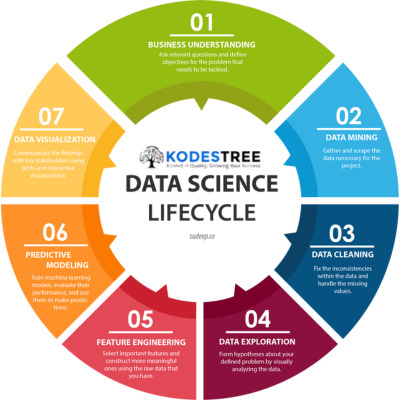
Who is a Data Scientist?
A data scientist is a professional who analyzes complex data to help organizations make informed business decisions. They combine statistics, programming, and domain expertise to extract meaningful insights from structured and unstructured data. Unlike traditional analysts, data scientists go beyond data reporting; they use machine learning, artificial intelligence, and predictive modeling to forecast trends and drive innovation.
Why is Data Science Important?
Data science plays a crucial role in multiple industries, including healthcare, finance, e-commerce, and more. Businesses leverage data science to optimize operations, enhance customer experiences, and make data-driven decisions that boost profitability. With the rise of artificial intelligence and big data, professionals skilled in data science are in high demand worldwide.
Core Skills Required for a Data Scientist
To become a data scientist, you need expertise in various domains. Here are some core skills required to excel in this field:
1. Programming and Data Manipulation
Proficiency in Python, R, and SQL
Working knowledge of data manipulation libraries such as Pandas and NumPy
Experience with database management systems
2. Mathematics and Statistics
Strong grasp of linear algebra, probability, and statistics
Understanding of hypothesis testing and statistical modeling
Knowledge of Data Science Statistics for analyzing datasets
3. Machine Learning and AI
Supervised and unsupervised learning techniques
Deep learning frameworks like TensorFlow and PyTorch
Model evaluation and optimization strategies
4. Data Visualization and Business Intelligence
Using tools like Matplotlib, Seaborn, and Tableau
Creating compelling visual stories from complex datasets
Communicating insights to non-technical stakeholders
5. Big Data and Cloud Computing
Working with platforms like Hadoop and Spark
Cloud-based services like AWS, Google Cloud, and Azure
Scalable data pipeline implementation
Educational Path to Becoming a Data Scientist
While some data scientists have formal degrees in computer science, statistics, or mathematics, others acquire skills through alternative educational paths. Here are some of the best ways to start your journey:
1. Pursue a Degree in Data Science or Related Fields
A degree in data science, computer science, or statistics provides a strong foundation. Many universities now offer specialized programs in data science that cover fundamental concepts and hands-on training.
2. Enroll in an Advance Data Science Course
For professionals looking to switch careers or upskill, an Advance Data Science Course offers a fast-track route into the field. These courses provide practical experience through real-world projects and case studies.
3. Earn a Data Science Certificate
A Data Science Certificate validates your expertise and increases your credibility in the job market. Many reputed institutions offer Data Science Certificate Programs that cover everything from machine learning to data visualization.
4. Participate in Online Learning Platforms
Platforms like Coursera, edX, and Udacity provide Data Science Programs that allow flexible learning at your own pace. These courses include interactive coding exercises, mentorship, and industry-relevant projects.
Career Opportunities in Data Science
Data science offers diverse career paths with lucrative salaries. Some of the most common roles include:
Data Scientist – Analyzes large datasets to drive business strategies
Data Analyst – Interprets data trends and provides actionable insights
Machine Learning Engineer – Develops AI models for automation and prediction
Business Intelligence Analyst – Transforms data into meaningful business reports
Data Engineer – Designs and maintains scalable data pipelines
How to Start Your Data Science Journey?
If you’re new to the field, follow these steps to build a successful career in data science:
Learn the Basics: Start with Data Science For Beginners courses to understand core concepts.
Build a Strong Foundation: Gain expertise in programming, statistics, and data visualization.
Work on Real-World Projects: Apply your knowledge to hands-on projects and case studies.
Join a Data Science Community: Engage with professionals, participate in hackathons, and network with industry experts.
Earn Certifications: Complete an Advance Data Science Course or a Data Science Certificate Program to boost your resume.
Apply for Jobs: Build a strong portfolio showcasing your skills and start applying for data science roles.
Future of Data Science
The future of data science looks promising, with advancements in AI, deep learning, and automation. Industries are heavily investing in data-driven solutions, making data science a critical skill in the modern workforce. Whether you’re a beginner or an experienced professional, continuous learning and upskilling through Data Science Great Learning programs will keep you ahead in the game.
Conclusion
A career in data science is rewarding, dynamic, and full of opportunities. Whether you're interested in analytics, machine learning, or big data, the field offers endless possibilities to innovate and grow. If you're ready to dive into this exciting career path, start with an Data Scientist Introduction course and unlock your potential in the world of data science.
Bonus Point - Kodestree provides best it courses Visit now at kodestree.com and check there affordable professional courses now!
#Data Science Programs#Data Science Statistics#Data Scientist Introduction#Data Science Certificate#Data Science Certificate Programs
0 notes
Text
AI in Marketing: Get Certified and Supercharge Your Strategy
Artificial Intelligence (AI) is revolutionizing marketing, transforming how brands connect with customers, optimize campaigns, and drive sales. From predictive analytics to AI-powered chatbots, businesses are leveraging AI to make data-driven decisions and create hyper-personalized marketing experiences.
As AI adoption accelerates, marketing professionals need to upskill to stay competitive. Earning an AI certification can help marketers master AI tools, understand consumer behavior, and develop high-impact strategies. This article explores the significance of AI in marketing, the best AI certifications available, and how they can enhance your career.

Why AI is Essential in Marketing
AI is no longer a futuristic concept — it’s a game-changer in marketing. Here’s why AI expertise is crucial for marketers:
1. Data-Driven Decision Making
AI enables marketers to analyze vast amounts of customer data, uncovering insights that drive more effective campaigns. Predictive analytics help brands anticipate customer needs and personalize marketing messages.
2. Hyper-Personalization
AI-driven marketing tools analyze user behavior, purchase history, and preferences to create highly targeted content. From personalized email recommendations to AI-powered ad targeting, brands can deliver unique experiences to each customer.
3. AI-Powered Content Generation
AI tools like ChatGPT and Jasper AI assist marketers in generating compelling copy, blog posts, and social media content, saving time while maintaining high-quality messaging.
4. Chatbots and Virtual Assistants
AI-driven chatbots provide instant customer support, answer inquiries, and guide users through the buyer journey, improving customer engagement and reducing response times.
5. Marketing Automation
AI enhances automation by optimizing ad targeting, scheduling posts, and managing email marketing campaigns. This helps brands reach the right audience at the right time with minimal manual effort.
With AI playing such a critical role in marketing success, professionals must upskill to leverage its full potential. Let’s explore the top AI certifications that can help marketers thrive in this AI-driven landscape.
Top AI Certifications for Marketing Professionals
1. AI+ Marketing™ by AI Certs
The AI+ Marketing™ certification by AI Certs is designed for marketing professionals looking to integrate AI into their strategies. It covers AI-powered customer insights, data-driven decision-making, and AI-driven marketing automation.
Key Topics Covered:
AI applications in digital marketing
Customer behavior analysis using AI
AI-powered ad targeting and personalization
Marketing automation and AI-driven content creation
Ethical considerations in AI marketing
This certification is ideal for marketing managers, digital marketers, and business owners aiming to maximize AI’s potential in their campaigns.
Use the coupon code NEWCOURSE25 to get 25% OFF on AI CERTS’ certifications. Don’t miss out on this limited-time offer! Visit this link to explore the courses and enroll today.
2. Artificial Intelligence in Marketing by Darden (Coursera)
Offered by the University of Virginia’s Darden School of Business, this course focuses on using AI to enhance customer engagement and marketing effectiveness.
Key Topics Covered:
AI-driven customer segmentation
Machine learning applications in marketing
AI-powered pricing and promotions
Ethical AI marketing practices
This certification is suitable for marketers who want to understand AI-driven customer analytics and behavioral insights.
3. AI for Marketers by AI Academy for Marketers
This certification provides a deep dive into how AI can be used to enhance various aspects of marketing, from content creation to lead generation.
Key Topics Covered:
AI in content marketing
AI-powered social media strategies
Using AI for predictive analytics
AI-driven SEO optimization
This program is great for digital marketing specialists and content marketers looking to leverage AI tools effectively.
Who Should Get an AI Marketing Certification?
AI marketing certifications benefit a wide range of professionals, including:
Digital Marketers: To optimize ad targeting, email campaigns, and content strategies.
Marketing Managers: To integrate AI into marketing operations and customer engagement.
Content Creators: To leverage AI-driven content generation tools for SEO and personalization.
Social Media Managers: To automate and enhance social media marketing efforts.
Entrepreneurs & Business Owners: To implement AI-driven marketing strategies for business growth.
How to Choose the Right AI Certification for Marketing
When selecting an AI certification, consider the following factors:
Your Career Goals: Choose a certification that aligns with your role and future aspirations.
Practical Applications: Look for courses that offer hands-on projects and real-world case studies.
Industry Recognition: Opt for certifications from reputable institutions or AI-focused organizations.
Flexibility: Online and self-paced courses are ideal for working professionals.
The Future of AI in Marketing
AI is transforming marketing, and its impact will only grow in the coming years. Here are some key trends to watch:
AI-Powered Video Marketing: AI will play a bigger role in video personalization and automated video editing.
Voice Search Optimization: AI-driven voice assistants will change how brands optimize content for search.
AI in Influencer Marketing: AI will enhance influencer identification and performance tracking.
Augmented Reality (AR) and AI Integration: Brands will use AI-powered AR experiences to engage customers.
Marketers who invest in AI education today will be well-positioned to lead in this evolving landscape.
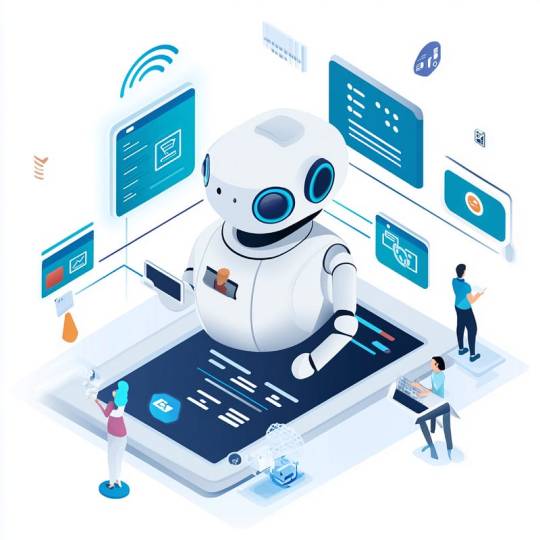
Conclusion
AI is reshaping the marketing industry, offering unprecedented opportunities for data-driven strategies, personalization, and automation. To stay ahead, marketing professionals must upskill with AI certifications that provide hands-on experience and practical applications.
The AI+ Marketing™ by AI Certs, Artificial Intelligence in Marketing by Darden, and AI for Marketers by AI Academy are among the top certifications to consider. These programs equip marketers with the knowledge and skills needed to leverage AI effectively, drive engagement, and boost conversions.
As AI continues to evolve, staying updated with the latest AI tools and trends will be crucial for marketing success. Now is the time to embrace AI, get certified, and supercharge your marketing strategy.
0 notes